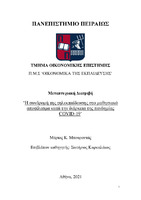Η συνδρομή της τηλεκπαίδευσης στο μαθησιακό αποτέλεσμα κατά την διάρκεια της πανδημίας COVID-19

Προβολή/
Λέξεις κλειδιά
COVID-19 ; Τηλεκπαίδευση ; Μαθησιακό αποτέλεσμα ; Σχολείο ; Μαθητές ; Εκπαιδευτικοί ; ΤΠΕ ; Εξ αποστάσεως εκπαίδευση ; Διδασκαλία ; Νέες τεχνολογίες ; Πλεονεκτήματα ; ΜειονεκτήματαΠερίληψη
Η παρούσα εργασία διερευνά τις επιπτώσεις της τηλεκπαίδευσης στο μαθησιακό αποτέλεσμα την περίοδο της πανδημίας του COVID-19. Το δείγμα αποτελούνταν από 85 καθηγητές δευτεροβάθμιας εκπαίδευσης (N=85), δημόσιων σχολείων και ιδιωτικών εκπαιδευτηρίων της Αττικής. Για τη συλλογή των δεδομένων χρησιμοποιήθηκε αυτοσχέδιο ερωτηματολόγιο.
Από την ανάλυση των δεδομένων προέκυψε ότι η εξ αποστάσεως διδασκαλία είχε αρνητική επίδραση στη συμμετοχή των μαθητών (78%), το ενδιαφέρον για μάθηση (58%), τη δυνατότητα για συνεργατική μάθηση μέσω της τηλεκπαίδευσης (57%), αλλά και το ενδιαφέρον τους προς τη μαθησιακή διαδικασία (58%). Ακόμη, τα αποτελέσματα καταδεικνύουν μεγαλύτερη δυσκολία συγκέντρωσης σε συνθήκες τηλε-διδασκαλίας (73%).
Επιπρόσθετα, η δυνατότητα για εξατομικευμένη υποστήριξη φαίνεται επίσης να επηρεάζεται αρνητικά, με μεγαλύτερες επιπτώσεις στους μαθητές με δυσκολίες και ιδιαιτερότητες (σχεδόν το 70%). Αναντικατάστατη φαίνεται να είναι και η άμεση φυσική επαφή ανάμεσα σε καθηγητή και μαθητή, καθώς η συντριπτική πλειοψηφία (79%) παρατηρεί αρνητική συσχέτιση της έλλειψης φυσικής επαφής με τη μαθησιακή διαδικασία.
Αναφορικά με τη δυνατότητα για εξατομικευμένη και πιο αυτόνομη μάθηση, το 38% των ερωτώμενων φαίνεται να θεωρούν ότι η τηλεκπαίδευση έχει θετική επίδραση, όμως το 30% των συμμετεχόντων φαίνεται να έχει αντίθετη άποψη.
Τέλος, διερευνήθηκε πως το είδος του μαθήματος (θετικού ή θεωρητικού περιεχομένου) και το εκπαιδευτικό πλαίσιο (δημόσιο ή ιδιωτικό ) επηρεάζουν κάποια από τα αποτελέσματα της έρευνας. Η μελλοντική έρευνα θα ήταν χρήσιμο να εξετάσει τους μηχανισμούς που διαμεσολαβούν τη σχέση ανάμεσα σε μαθησιακό αποτέλεσμα και την τηλεκπαίδευση.


